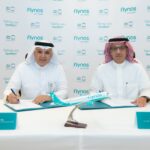Image: In-Space Missions
In-Space Missions has been awarded a grant from the UK Space Agency’s International Bi-lateral Fund to develop Faraday Dragon, the first Asia-Pacific regional and multi-agency technology and business accelerator programme created to provide regular in-orbit payload rideshare missions.
The matched fund grant will enable In-Space Missions to set up the collaboration framework and develop the mission definition for Faraday Dragon with partners in the region, working towards the design, build and launch in 2026 of the first in the series of rideshare missions.
“With the Asia-Pacific region being a current focus of UK space export growth, In-Space Missions is thrilled to be leading this bold endeavour to unlock low-cost, predictable space flight and increase technology readiness levels for novel and innovative technologies from the region. Our Faraday Rideshare programmes, where multiple customers share one satellite platform, is a more sustainable way to do space missions and we are committed to limiting space debris in this way and supporting the sustainability aims of the UK Space Agency.”
Work shops
In-Space Missions, a wholly owned subsidiary of BAE Systems, launched the concept for Faraday Dragon at the Global Space Technology Forum held in Singapore in February and has been progressing towards a blueprint for the mission architecture through a series of discussions and in-country workshops with government bodies, space agencies, commercial organisations and academia in the region. The discussions with organisations from Thailand, the Philippines, Singapore, Indonesia, and Taiwan have already identified mutual areas of interest for the first mission including agricultural monitoring, low-cost and accessible connectivity, radio frequency observation and processing, and disaster monitoring.
The immediate benefit to the partners is value for money with the cost of flying a payload on Faraday Dragon being much less than can be achieved on a dedicated mission, even a Cubesat. The Faraday Dragon spacecraft offers small satellite performance, carrying up to 60kg of payload and a payload power up to 200W, along with 1 TByte of data storage, a high-rate downlink and a mission lifetime of 5 years or more. In addition, collaboration provides an opportunity for sharing data and the joint outcome of the payloads, along with knowledge, experience and training. Operation of the spacecraft and payloads can also be shared between partners and executed from within each country co-ordinated by the In-Space Missions Operations team. The programme opens up many opportunities for in-country capacity building – for example, assembly, integration and test can be performed in the region with potential for further industrialisation and Faraday Dragon’s open architecture is available for exploitation all the way through to full customisation for an indigenous spacecraft capability.
Subscribe to the FINN weekly newsletter
You may also be interested in
Space-Comm Expo 2023: BAE Systems’ Azalea mission to transform data collection
UK Space Agency announces £15m funding for Earth monitoring
Branson’s ‘tears of joy’ as Virgin Galactic space flight completes mission

